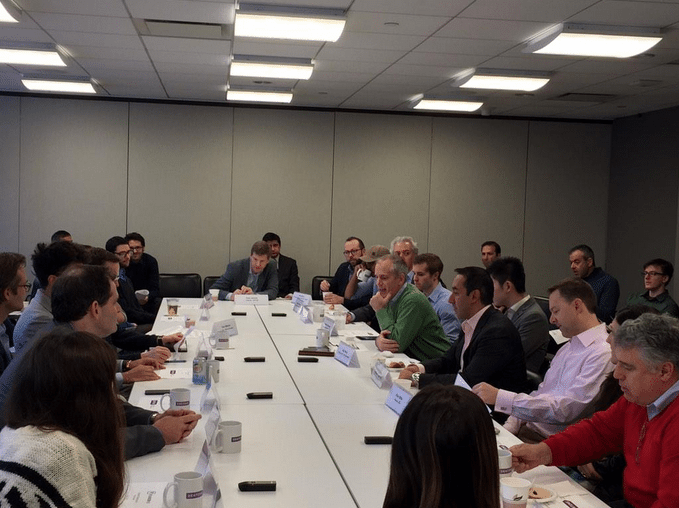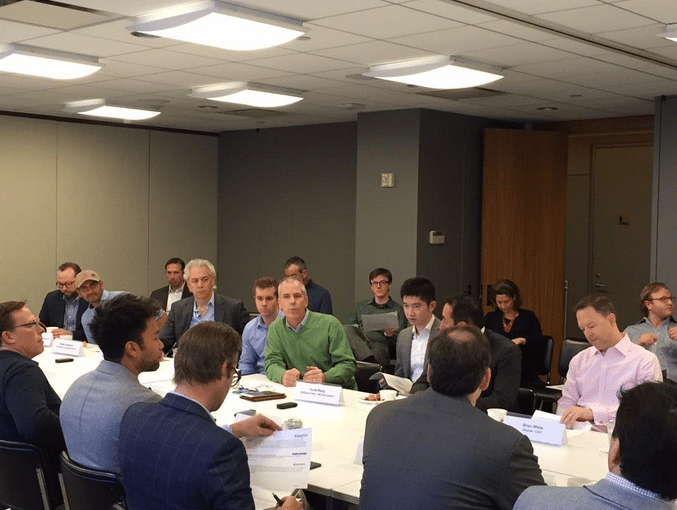
Last Wednesday, Taboola participated in one of PluggedIn BD’s popular monthly roundtables to discuss the topic of Content Distribution. The wide-ranging conversation included executives from a variety of companies, spanning established media (New York Times, WIRED) to new media (PlayBuzz, Huffington Post) to content marketing firms (NewsCred, Moveable Media) and content distribution platforms (including Taboola).
With such a big topic, and a wide cast of perspectives, the discussion underscored how much change is occurring in the online content space, and how the blurring of roles and buzzwords seems to be a constant reality.
Jason Sylva, Executive Director of Audience Development at the New York Times, explained how the country’s paper of record is now both a content marketing seller (T Brand Studio is its in-house advertorial team) and a buyer (having placed native ad buys on sites like BuzzFeed). Kik Messenger strategic head Devrin Carlson-Smith confidently predicted that “whoever wins Chat will win Mobile,” and Keywee co-founder Yaniv Makover reminded the audience that just three years ago Facebook was a non-factor in this space.
Widespread changes in the roles played by publishers and platforms reflect a media landscape that has become flatter and more fragmented. EngageSimply founder and CEO Judy Shapiro noted that “[content marketing] is not a new conversation” — advertorials in the form of shows and specials and magazines have been around for decades. The paradoxical reality is that although we have a new array of tools and platforms with which to speak to audiences, it harder than ever to reach them and engage their attention.
This challenge was top-of-mind for many of the marketing executives at the table, whose shared consensus was that moving further through the sales funnel is a top priority for 2015. Andrew Boer, founder of Moveable Media, said that the biggest problem facing brands who have experimented with content marketing is “how to convert those readers into customers.” Ms. Shapiro identified “mid-funnel” as a particular challenge — the crucial limbo where consumers have entered the “consideration” phase but still often click away before proceeding towards a purchase.
Taboola’s Paul Jelinek, SVP of Business Development, suggested that the smartest near-term move would be to focus attention on marketers whose content is most closely aligned with their business goals. These marketers are poised to scale and, in aggregate, make up a critical mass of the market.
“Nearly 70 percent of digital advertising is performance-based,” said Jelinek. “Performance marketers are already creating great bottom-of-the-funnel content. The ‘brand’ side is definitely happening, but it’s still in its early days.”

Given the amount of disruption in the e-commerce space, it also seems possible that the sales funnel could take on entirely new shapes or permutations. Kelly Gallagher, VP of Content Acquisition at Ingram Content Group, argued that “the funnel has collapsed to purchase,” noting features like Google or Amazon’s “Buy” button that can be embedded directly into social posts.
An underlying theme throughout the discussion was the renewed importance of authenticity as brands attempt to engage consumers through higher-quality content. Ashley Healy (VP Sales, DailyWorth) described the need for more creative pathways to conversion, beyond the stale banner ad that leads to a sign-up page. Kik Messenger’s Carlson-Smith suggested “opt-in” arrangements as a great method for ensuring that new relationships with consumers are authentic.
Another important factor in the drive towards authenticity is personalization, or the idea of serving distinct experiences and pieces of content for each individual reader. Mr. Makover noted that personalization is very difficult, and “there are few apps or companies that can predict what exactly someone want to read, especially for very customized topics.” Taboola is one of the few companies making strides towards solving this problem, with plans to evolve personalization beyond just content recommendations to comprehensive user experiences.
As the online content space continues to grow more cluttered, authentic channels may be even more important than the content itself. Ideal Media CEO Eder Holguin noted that we can already see “certain distribution networks that have powerful niches and positions,” due to the premium real estate they operate on top-tier publishers around the web. Moveable Media’s Andrew Boer noted that despite claims that metrics such as clicks are outdated, they remain a valuable barometer for showing the real movement of an audience.
The talk touched on several other themes, each of which — PluggedIn BD managing director Eli Mandelbaum joked — could spawn their own hour-long sessions. With so many new publishers and platforms and technologies entering the space, one certainty is that 2015 will look very different than 2014, and we’re going to need several more roundtables to hash it all out.